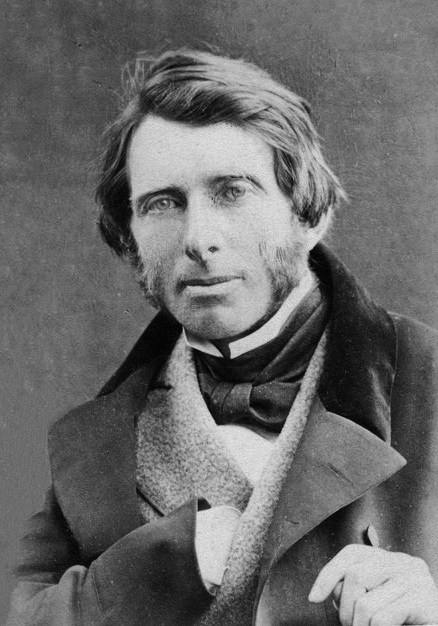Frases célebres de John Ruskin
Fuente: [Amate Pou], Jordi. Paseando por una parte de la Historia: Antología de citas. Editorial Penguin Random House Grupo Editorial España, 2017. ISBN 9788417321871, p. 117.
Fuente: [Marcelino Aranda], Mariana; [Ramírez Herrera], Dania. Administración de la Calidad: Nuevas Perspectivas. Grupo Editorial Patria, 2014. ISBN 9786074388169, p. 12.
John Ruskin Frases y Citas
“La sinceridad es la raíz de todas las virtudes.”
Fuente: [Muñoz], Asun. El baúl de los sueños. Editorial Palibrio, 2014. ISBN 9781463369644.
“La misma esperanza deja de ser felicidad cuando va acompañada de la impaciencia.”
Variante: La propia esperanza deja de ser una felicidad cuando va acompañada de la impaciencia.
Fuente: [Palomo Triguero], Eduardo. Cita-logía. Editorial Punto Rojo Libros, S.L. ISBN 978-84-16068-10-4, p. 120.
Fuente: [Barón Escamilla], Carlos. AC: Arquitectura de containers. Editorial Lulu.com, 2014. ISBN 9788461693177, p. 10.
“Más vale una muleta que la pérdida de un miembro.”
Ruskin condenaba la «restauración en estilo» de Viollet-le-Duc y sus seguidores en Inglaterra de los monumentos y edificios antiguos; consideraba la restauración tan imposible «como resucitar a los muertos», y sólo admitía intervenir para paliar preventivamente que el monumento se disgregue, o consolidar con vigas cuando se hunda, y de ahí la expresión de la cita.
Fuente: [García Morales], M.ª Victoria; Victoria [Soto Caba], Joaquín [Martínez Pino]. El Estudio del patrimonio cultural. Editorial Centro de Estudios Ramon Areces, S. A., 2017. ISBN 9788499612140, p. 185.
John Ruskin: Frases en inglés
Also misattributed to John Steinbeck.
Fuente: The Works of John Ruskin: The stones of Venice, v. 1-3
“When love and skill work together, expect a masterpiece.”
Widely attributed on the Internet to John Ruskin; see this Google search https://www.google.com/search?num=50&q=%2B%22When+love+and+skill+work+together%2C+expect+a+masterpiece.%22+%2B%22John+Ruskin%22+-%22Charles+Reade%22&oq=%2B%22When+love+and+skill+work+together%2C+expect+a+masterpiece.%22+%2B%22John+Ruskin%22+-%22Charles+Reade%22&gs_l=serp.12...143064.148395.0.150598.2.2.0.0.0.0.108.196.1j1.2.0....0...1c.1.64.serp..0.0.0.JURsIFvRl34 for thousands of pages containing the quote AND "John Ruskin" but NOT "Charles Reade".
This is actually from Put Yourself in His Place by Charles Reade.
Misattributed
“There is no wealth but life.”
Fuente: The King of the Golden River
A Joy for Ever, note 6 (1857).
Contexto: For certainly it is excellent discipline for an author to feel that he must say all he has to say in the fewest possible words, or his reader is sure to skip them; and in the plainest possible words, or his reader will certainly misunderstand them.
Volume I, chapter II, section 17.
The Stones of Venice (1853)
Variante: Remember that the most beautiful things in the world are the most useless.
Contexto: You were made for enjoyment, and the world was filled with things which you will enjoy, unless you are too proud to be pleased with them, or too grasping to care for what you cannot turn to other account than mere delight. Remember that the most beautiful things in the world are the most useless: peacocks and lilies, for instance.
According to Ruskin scholar George P. Landow, there is no evidence that this quotation or its variants can be found in any of Ruskin's works.
[Landow, George P., A Ruskin Quotation?, VictorianWeb.org, 2007-07-27, http://www.victorianweb.org/authors/ruskin/quotation.html, 2013-01-07]
Disputed
Volume III, part V, chapter II (1856).
Modern Painters (1843-1860)
Fuente: Dictionary of Burning Words of Brilliant Writers (1895), P. 170.
The Work of Iron, in Nature, Art, and Policy http://books.google.com/books?id=uYEM0Sd18DsC&q="you+may+either+win+your+peace+or+buy+it%22+%22win+it+by+resistance+to+evil%22+%22buy+it+by+compromise+with+evil"&pg=PA196#v=onepage Lecture at Tunbridge Wells (February 16, 1858).
Fuente: Dictionary of Burning Words of Brilliant Writers (1895), P. 147.
“When we build, let us think that we build for ever.”
Fuente: The Seven Lamps of Architecture (1849), Chapter VI: The Lamp of Memory, section 10.
Fuente: The Seven Lamps of Architecture (1849), Chapter II: The Lamp of Truth, section 1.
“Of human work none but what is bad can be perfect in its own bad way.”
Volume II, chapter VI, section 24 http://books.google.com/books?id=AwICAAAAYAAJ&q=%22Of+human+work+none+but+what+is+bad+can+be+perfect+in+its+own+bad+way%22&pg=PA189#v=onepage.
The Stones of Venice (1853)
“Of all God's gifts to the sight of man, colour is the holiest, the most divine, the most solemn.”
Volume II, chapter V, section 30.
The Stones of Venice (1853)
Volume II, chapter IV, section 103.
The Stones of Venice (1853)
Sesame and Lilies, lecture II: Lilies http://www.fullbooks.com/Sesame-and-Lilies3.html
Volume III, part IV, chapter XII (1856).
Modern Painters (1843-1860)
Variante: All violent feelings have the same effect. They produce in us a falseness in all our impressions of external things, which I would generally characterize as the pathetic fallacy.
